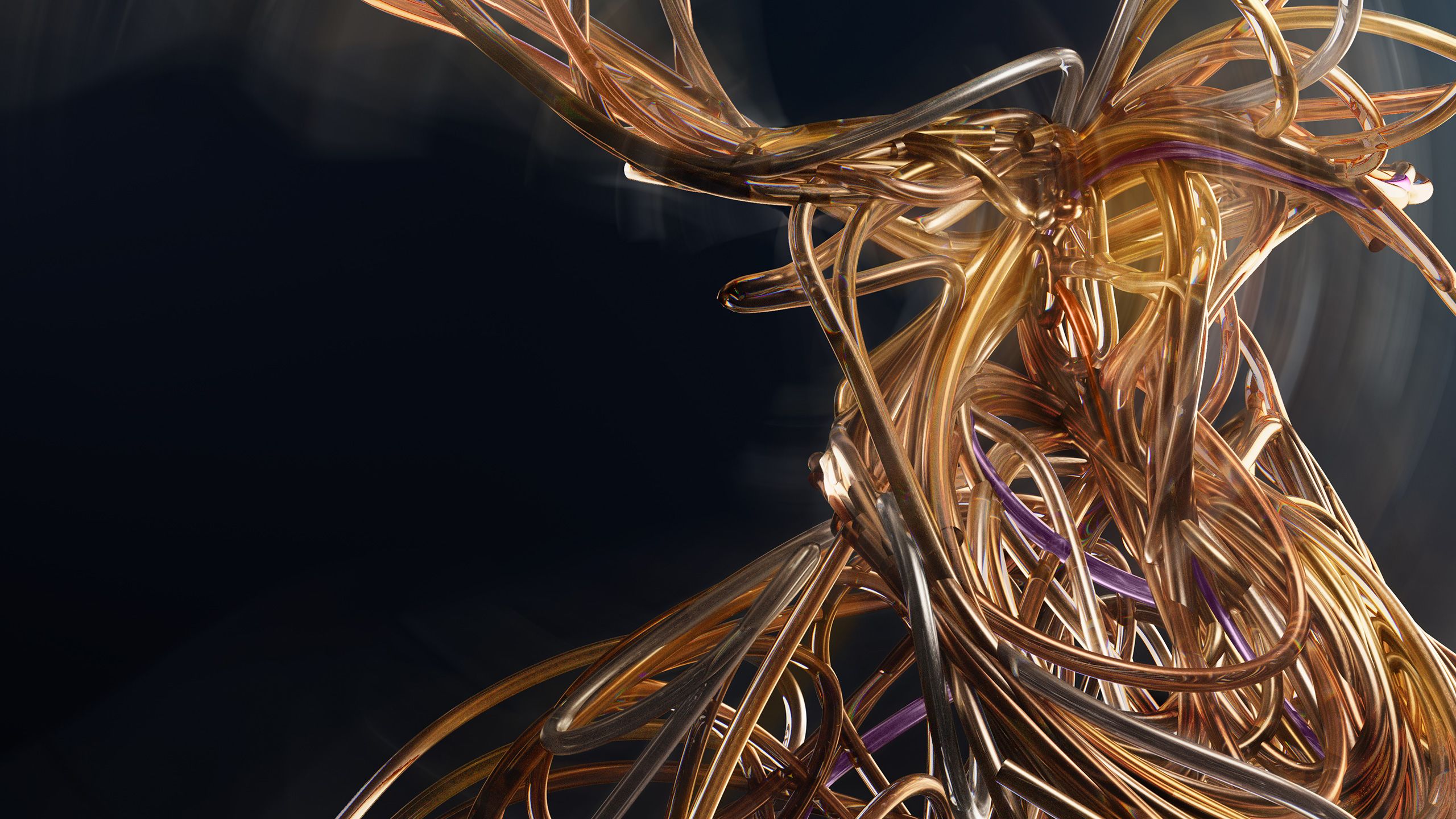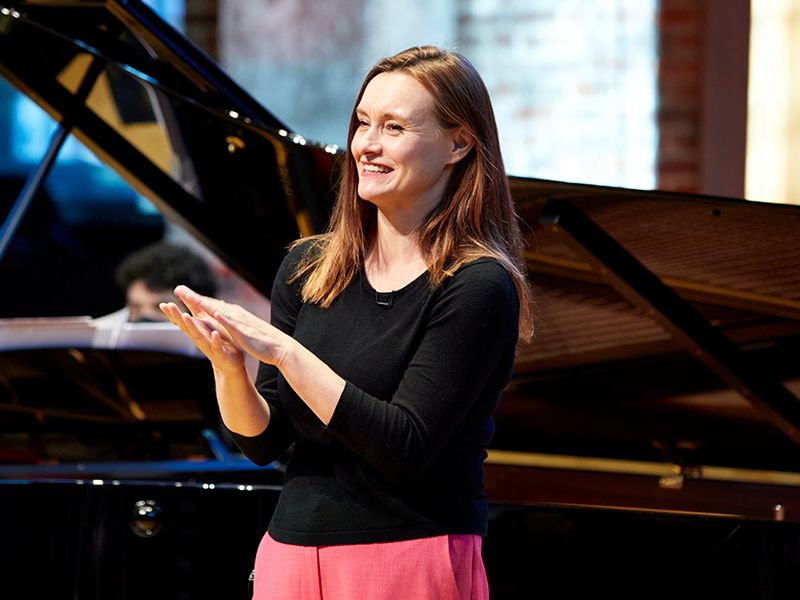LSO Discovery
Free Friday Lunchtime Concert

TODAY'S CONCERT
Grażyna Bacewicz Song, Krakowiak No 1, Nocturne and Grotesque March from Duets on Folk Themes for Two Violins
André Jolivet Sonatine for Oboe and Bassoon
Frank Bridge Lament for Two Violas
Darius Milhaud Concerto for Percussion
Zoe Hodi violin
Ivelina Ivanova violin
Charis Lai oboe
Thaïs Bordes bassoon
Kelvin Chan viola
Teresa Macedo Ferreira viola
Jovi Lo percussion
Alison Ma piano
Rachel Leach presenter
USING YOUR DIGITAL PROGRAMME
- Connect to the free hawksmoor WiFi network.
- Navigate using the menu icon (≡) at the top of the screen.
- Please set your phone to silent and don't use other apps during the music.
Grażyna Bacewicz (1909 to 1969)
Folk Themes for Two Violins
✒️ 1945 | ⏰5 minutes

5 Song
1 Krakowiak No 1
2 Nocturne
6 Grotesque March
Prolific Polish composer Grażyna Bacewicz was born into a musical family in Łódź. Bacewicz received her first lessons on violin and piano from her father. She studied at the Warsaw Conservatoire, graduating in 1932 as violinist and composer and then travelled to France to study with the great Nadia Boulanger. During World War II, concerts and composing were banned in Warsaw but Bacewicz continued in secret. To the wider world she was ‘just’ a wife and mother but to a select few she was a vital part of the underground arts scene, composing, performing and organising illegal concerts. These ‘easy’ duets were written in 1945 and similarly to Béla Bartók’s set were initially used as teaching materials. They feature folk tunes and rhythms alongside a dash of modernity. Today we will hear ‘Song’, ‘Krakowiak No 1’ (a slow Polish waltz), ‘Nocturne’, and ‘Grotesque March’.
Note by Rachel Leach
André Jolivet (1905 to 1974)
Sonatine for Oboe and Bassoon
✒️ 1963 | ⏰8 minutes

1 Ouverture
2 Récitatif
3 Ostinato
As a young student, French composer André Jolivet dreamed of writing music for the theatre and following in the footsteps of the great French composers Maurice Ravel and Claude Debussy. However, when he discovered the atonal music of Arnold Schoenberg everything changed for him. Born in Paris into an artistic family, Jolivet was encouraged to become a composer when one of his teachers noticed his talent. His career took many twists and turns as his music developed through atonalism to become reflective of the past (neo-Classical), and finally to focus on concerto and solo instruments providing technical challenges for his performers. He even achieved his youthful dream of writing for the theatre when he took the post of music director to the Comédie-Française in the 1950s. This Sonatine was written in 1963 alongside several other similar short pieces for various duets. It features three movements entitled ‘Overture’, ‘Recitative’ and ‘Ostinato’.
Note by Rachel Leach
Frank Bridge (1879 to 1941)
Lament for Two Violas
✒️ 1911 | ⏰8 minutes

Frank Bridge was born in Brighton, studied at the Royal College of Music with Charles Villiers Stanford, and made a name for himself initially as a viola player of some standing. His early compositions are often described as ‘pastorale’ and are of a lush, late-Romantic style. When World War I struck, Bridge found his inner feelings out of step with this light chamber style and he looked towards the emerging Viennese serialist composers for inspiration. His last works were in a much more uncompromising musical language and were largely overlooked during his lifetime: the safe Proms audience who had loved him just weren’t ready for this new sound. This lament was written in 1911 for a concert promoting new, young composers. The brief was to write for viola soloist Lionel Tertis who then went on to champion this work. It has become a central part of any violist’s repertoire.
Note by Rachel Leach
Darius Milhaud (1892 to 1974)
Concerto for Percussion
✒️ 1929 | ⏰8 minutes

1 Rude et dramatique
2 Modéré
Darius Milhaud was one of the most prolific composers of the 20th century. It is often said about him that writing music was as quick and natural as breathing and over his lifetime he published a staggering 443 works! He was part of the Parisian group of composers nicknamed ‘Les Six’ who had little in common other than their respect for older composer Erik Satie, and the coffee shops they drank in. Milhaud was profoundly influenced by the sounds of Harlem jazz after a trip to the United States in 1922 and so, in 1940, he emigrated to the US to avoid the Nazis. He then became an important composition teacher with Karlheinz Stockhausen, Dave Brubeck and Philip Glass among his many students. This Concerto, from 1929, was the first of its kind and it remains the most performed percussion concerto in the repertoire. It is structured in two movements which run without a break. They are called ‘lively, rough and dramatic’ and ‘moderate’. Today we will hear the Concerto as it was arranged for piano and percussion by the composer himself.
Note by Rachel Leach
About Orchestral Artistry

The Guildhall School’s Orchestral Artistry programme is an exciting professional specialism for advanced instrumentalists seeking a career in orchestral playing, delivered in association with the LSO. It offers a course of study which is both highly distinctive and ground-breaking in scope, in a context akin to a professional environment.
The two-year Masters programme focuses on orchestral training and repertoire, as well as audition preparation, practical training in education and community-based programmes, and early career support. LSO musicians share their knowledge and experience with the next generation of gifted orchestral players, while students gain confidence and a detailed understanding of what is required at the highest level of the profession as they build their careers.
Today's Performers
*Zoe Hodi violin
Ivelina Ivanova violin
*Charis Lai oboe
*Thaïs Bordes bassoon
*Kelvin Chan viola
Teresa Macedo Ferreira viola
*Jovi Lo percussion
Alison Ma piano
*Guildhall Artist Masters students on the Orchestral Artistry programme
Today’s performers also include students on other programmes at the Guildhall School, and at the Royal Academy of Music.
Rachel Leach
presenter
Rachel Leach was born in Sheffield. She studied composition, and her music has been recorded by NMC and published by Faber. She has won several awards including, with English Touring Opera, the RPS Award for best education project 2009 for One Day, Two Dawns.
Rachel has worked within the education departments of most of the UK’s orchestras and opera companies. The majority of her work is for the London Symphony Orchestra and the London Philharmonic Orchestra. Rachel has written well over 20 pieces for LSO Discovery and 15 community operas, including seven for the English Touring Opera.
Increasingly in demand as a concert presenter, as well as presenting the LSO Discovery Free Friday Lunchtime Concert series, she regularly presents children’s concerts and pre-concert events for the LSO, LPO, Philharmonia Orchestra, Scottish Chamber Orchestra, Royal College of Music and Royal Northern Sinfonia.
Next Friday Lunchtime Concert - Relaxed Performance
Friday 7 June 2024 12.30pm
LSO St Luke's and online

LSO Create Monday Club
Mark Withers presenter
Angie Newman BSL interpreter
LSO Create Monday Club, LSO Discovery’s participatory collective of neurodivergent adults and supporters, take over this Relaxed Concert. They present works devised and performed by players from the group, alongside LSO musicians.
The concert will also be livestreamed on YouTube.
About Relaxed Performances
Our relaxed concerts are tailored for people who have sensory and communication impairments, learning disabilities, or who are neurodiverse. Everyone over the age of 5 who feels more comfortable attending concerts in a relaxed environment is welcome.



